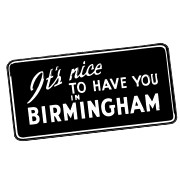It does feel a little rushed when you take a look at just how quickly the majority of the Birmingham City Council moved to authorize Mayor Langford to use $48 million originally earmarked for construction of a domed stadium for improvements to the Fair Park Arena property. The problem is not the proposal itself (they are welcome news to residents and existing merchants – for now) not the fact that the business community that Langford turned to for an independent analysis of locations for that facility is due back with a report soon (that may not provide the support for his preferred location). It’s the long term implications of shifting focus.
Most of the 2+ years I spent working in Birmingham’s nonprofit realm was spent making sure that people didn’t sell the city’s west side short. The term City of Perpetual Promise seemed to be created for the side of town that boasts some of its most beautiful gems of architecture and its most realistic chance of truly realizing a civic renaissance. It is the sleeping giant waiting to be awakened from its slumber.
While most people would drive down I-20 to get across town, I’d get on 8th Avenue North and just keep on driving west; getting a chance to paint pictures in my head of what a reenergized Western commercial corridor would look like as cars drove through Smithfield and by a renovated Legion Field and thinking of what it would look like with renovated buildings along Tuscaloosa and Lomb Avenues (if you made that left turn on Arkadelphia) and throughout Ensley’s historic downtown area. Along the way, I met and worked with merchants and residents who saw and believed in that same vision.
Whether we always agree with our elected officials or not, when they take office, there is normally some level of genuine interest in doing right by their city and their constituents. Many of these same constituents are probably tired of waiting for their moment to come where someone will come in and save their community. Despite believing that it can happen, they will look at an investment that is city-led as another example of why no one wants to help.
There are currently several organizations throughout the city that have been working on improving the quality of life for its residents for many years. Many of these organizations are operating with far less financial support than necessary. While it is great that the mayor has taken the initiative to push for projects to be completed that would inject new life into portions of the city, perhaps spreading the wealth through organizations like Urban Impact, Operation New Birmingham and Main Street Birmingham would bring about a balanced approach throughout The Magic City. There are many who believe these organizations have taken too long and that a quick fix would solve the problem of urban decay quickly. But it will be that, a quick fix and (unless the public is engaged) one that will lead to other issues that we may not be ready to deal with yet.
Revitalization of Fair Park is not insane at all. New businesses have recently invested in the area, including Serra Honda, an expanded Schaeffer Eye Center and the newest Applebee’s restaurant in the area. There is also movement beginning on the site of the HOPE VI development near downtown Ensley. There is a captive audience that would benefit from this renewed effort to energize the community. The question is how will it benefit those long-time businesses and individuals that have invested in the future of their neighborhoods, for the long term?
André Natta is the publisher and managing editor of The Terminal.





 So we’re going to look to an old slogan for the city for some inspiration for a new series of submissions about The Magic City. The 1961 “It’s Nice to Have You in Birmingham” campaign is one that still rings in the ears of residents in the region both young and old. We’d like for you to take a new look at that statement – to really think about who you like to see every day in Birmingham and why. We’re hoping that it will help us develop a mosaic of careers, backgrounds, personalities and missions that best exemplify the best thing about Birmingham – its people.
So we’re going to look to an old slogan for the city for some inspiration for a new series of submissions about The Magic City. The 1961 “It’s Nice to Have You in Birmingham” campaign is one that still rings in the ears of residents in the region both young and old. We’d like for you to take a new look at that statement – to really think about who you like to see every day in Birmingham and why. We’re hoping that it will help us develop a mosaic of careers, backgrounds, personalities and missions that best exemplify the best thing about Birmingham – its people.

With apologies to Mr. Dylan…
Editor’s note: Today’s my Birmingham guest blogger is Barry Copeland.
Those who observe the passing scene on 20th Street in downtown Birmingham today could make an effective case that we’ve just rolled back the clock 40 years. It’s 1968 all over again, and it seems as though everything that has been happening in my town is bad. Not just bad, in fact, it’s awful. It’s almost as if you could pick an issue – any issue – and bet safely that it’ll be the subject of conversation somewhere in some forum in the coming week. The issue could be elected officials, or proposed projects, the actions (or inactions) of any legislative body, our environment, our schools, our businesses, our infrastructure. The list of negative things to cuss and discuss is endless. I think, in fact, that we may be at the point now where an alternative view is not only a pleasant change – it’s becomming essential for the maintenance of our collective regional sanity.
So, with apologies to Mr. Dylan – and consistent with a move up to 20th Street (the most important street in Alabama, I would offer) – here is Vol. 1, No. 1 of Positively 20th Street. And let the emphasis be on the word Positively for that’s what this little blog will be about. What’s good in Birmingham.
I like the idea of the city’s “Believe in Birmingham” web site, and I like what Mayor Langford says on the site. “We can’t expect anyone to believe in us until we believe in ourselves.” Amen! Admittedly my view is limited, but I’m convinced there are many great things happening in Birmingham these days that deserve a forum, and that is the intended purpose of “Positively 20th Street.”
Here’s one such conversation starter, with the promise of more to come in future posts. Do you know that the UAB community is now about the size of the city of Gadsden? Actually, on any given day, UAB now claims approximately 17,300 students and another 18,000 faculty, staff, physicians, etc. Add to that about 786 patients a day, on average, and their families, and you have Gadsden. It’s a very fluid population, but the economic impact is hard to ignore – and we ignore it at our peril. UAB’s economic impact is now about 12-to-1, meaning, In layman’s terms, that for every dollar the state invests in UAB, roughly $12 will be returned into Birmingham and Alabama’s economy. So when the state invests $50 million, as it agreed to do last year, the impact of that investment in our region and state, over time, is something in the neighborhood of $600 million. What’s not to love about that?
UAB – and so much more – is good for Birmingham. And to that point, you may expect more – later.
Barry Copeland is executive vice president of the Birmingham Regional Chamber of Commerce. Check out his blog over at Positively 20th Street, where this entry was originally posted on April 14. Head on over there and share your comments on this first post (or you can let him know through our comments section).
Leave a comment
Posted in Commentary, guest, regional
Tagged AL, Alabama, appearance, Barry Copeland, Birmingham, Commentary, editorial, guest blog, positively 20th street, post